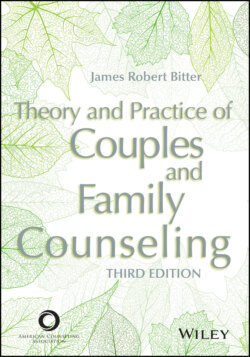Читать книгу Theory and Practice of Couples and Family Counseling - James Robert Bitter - Страница 86
Summary
ОглавлениеIn this chapter, we have looked at the personhood of the family counselor—both as a practitioner and as a scholar. One of the most important issues in family practice is the attention that must be given to personal growth and development. Working with families is both complicated and exciting: It appeals to those who like challenges, who look forward to engaging with others, who see life in relational terms, and who want to make a difference in human systems. The work is personal; it happens up close. It is the kind of work that touches our own life experiences and all too easily reminds us of our own family concerns and issues. Sorting through our life experiences, personal concerns, and family issues is essential to meeting families in an open and grounded manner.
You will learn many things throughout your training as a family counselor. Asking families to see themselves in a new way requires us to be able to see our own families in a new way. Helping families through the change process is more easily facilitated when we have engaged in purposeful changes ourselves. Developing our professional processes in a therapeutic relationship is just part of the larger experience of paying attention to the relationships we have in the rest of our lives.
To be an effective family counselor, you must also engage in self-care (see Corey et al., 2018). Family practitioners who are on the front line of offering services will often see as many as 30 couples or families a week. They are constantly in the mode of caring for others. This is the nature of the work we do. Still, it is important for us as family counselors to put ourselves on the list of those who need care; that is, the care we give others is directly impacted by our ability to engage in self-care.
